<<Initiative Home << All Initiatives
Español | Portuguese
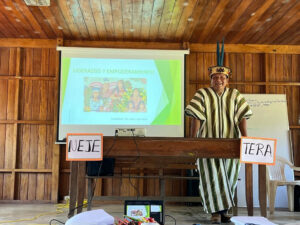
Mecanismo de Gobernanza Territorial >>
Events
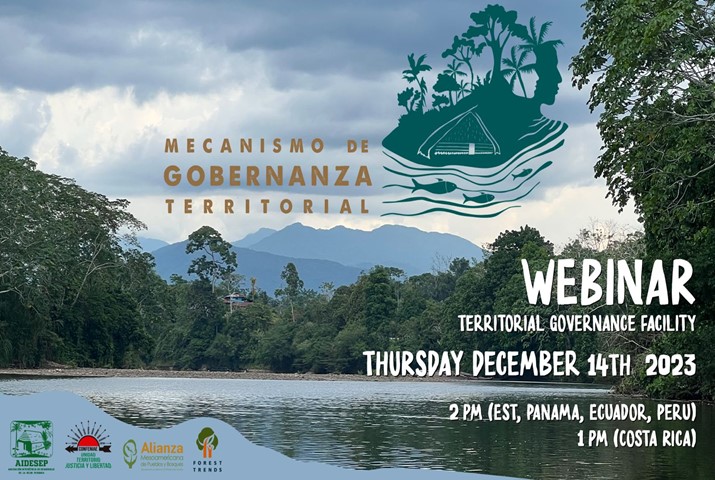
Webinar | Tuesday, December 14th, 2023 | 2:00 PM EST
This webinar will bring together Facility participants; partners; organizations from prospective project locations representing indigenous, local, and afro-descendent communities; and foundations and other financial supporters. It will focus on the Facility’s structure and design, the current implementation of its first five pilot projects, and what the next phase for the Facility will look like.
There is a gap in aid money for climate mitigation: less than 1% reaches indigenous peoples and local communities (IPLCs) directly. Investment is needed to strengthen IPLC governance so they can continue to protect their territories and participate as equal partners in climate and conservation finance.
Forest Trends established an IPLC Territorial Governance Facility (“Territorial Governance Facility” or “Facility”) to fill this gap and meet the need to provide culturally appropriate support to IPLCs looking to strengthen governance and engage in climate and conservation finance projects and programs. Read our latest update on the Territorial Governance Facility here.
The Facility is supporting activities in three main areas:
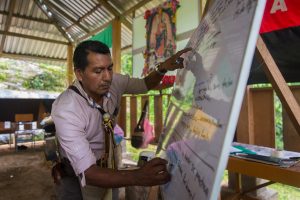
1) Political Governance
The Political Governance Program focuses on providing IPLCs with tools for better management and/or administration at the local level. Strengthening this capacity allows 1) better representation of the interests and desires of communities and families (with special attention to gender and intergenerational equity), and 2) more effective defense of their interests and territories during engagement with external actors, especially local and regional governments, and in situations that threaten the territorial integrity and conservation of their forests.
2) Economic Governance
The Economic Governance Program is focused on the valorization of a community or territory’s natural resources in a way that recognizes them as common goods and promotes equitable Good Living (Buen vivir) for all families and communities. This Program promotes discussion and co-creation processes within territories, aimed at ensuring their economies, food security, and resource use are sustainable. The Program also helps incubate self-determined economic enterprises and build relationships to ensure equitable market access.
3) Cultural Governance 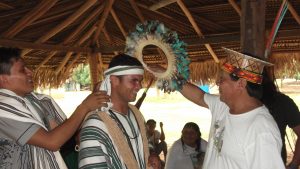
The Cultural Governance Program is grounded in IPLCs’ need to guarantee the survival of their languages, knowledge, and traditional practices in the face of cultural erosion. Non-indigenous values, knowledge, and ways of life are a threat to IPLCs’ cultural integrity and survival, especially through schools, the media, and Internet access via cell phones. It is therefore extremely important that territorial governments develop programs and activities with an intercultural approach to engage youth, share and preserve knowledge, and promote dialogue between generations.
Building on over 20 years’ experience, Forest Trends provides initial institutional structure, technical capacity, and a framework for building an independent Facility with multi-stakeholder governance and the capacity to mobilize private and public finance at scale. An initial emphasis has been placed on Latin America, with potential to scale globally. The ultimate aim is to create an independent vehicle with multi-stakeholder governance, multi-donor structure, and capability to rapidly scale up mobilization of private and public funding. During this first phase, the Facility included a Steering Committee comprised of representatives of IPLC organizations, initial funders, and globally respected individuals to steer its design and initial investments.
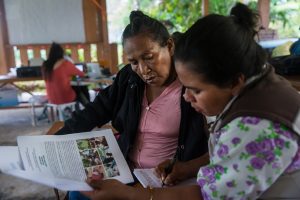
The Facility is supporting IPLC communities and territories by:
1) Offering training, networking, and capacity building programs to strengthen territorial governance
2) Connecting them to multiple sources of funding for political, economic, and cultural governance projects
3) Assisting them in their interactions and partnerships with governments and private companies to obtain direct climate and conservation finance
Contact: Marcio Halla, marcio.halla@nullforest-trends.org
Local Economic Initiatives Lead, Communities & Territorial Governance Initiative
Capacity Building Program on Indigenous Territorial Governance (PFGTI)
Supported by


